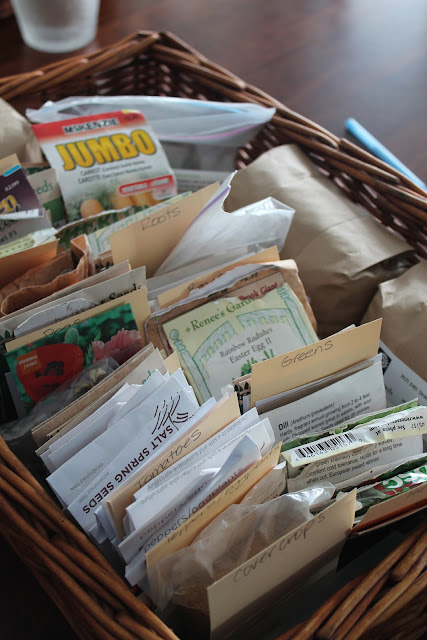I'm both IN and OUT of my element. IN it, in that I've spent the better part of the last 6 months learning about organic land care, and OUT of it in that I'm embarking on a entirely new way of doing things (permaculture).
I've begun (extreme emphasis) to create a design plan for our property according to permaculture ethics/design and it's safe to say that NOTHING will be the same as before. We are starting with a fresh slate this year and I'm actually grateful that it's still winter as I'm nowhere NEAR ready to begin making changes (there's still SO much to learn).
I DO know that this year, I'll be experimenting with cover crops to help me deal with soil compaction in some areas of our garden. Here's my reasoning, taken from my soil management assignment submitted during my Organic Master Gardener Course:
...
1)
April seeding (contingent on snow melt) of climate
appropriate green manure crops
(small seed fava beans and buckwheat in my case) will be beneficial for the
following reasons:
-
improving
soil structure when the manure crop is
cut down and is decomposed by the soil biology (creating humus).
-
loosening
compaction as the roots reach down in
search of nutrients, and as humus is created during decomposition.
-
improving
the water holding capacity of my soil by
protecting the exposed soil from water loss due to evaporation and drying
winds, and again as water holding humus is created through the decomposition
process.
-
optimizing
fertility by providing plenty of food for
the soil microbes when the cover crops are mulched on the garden in late
Spring. Additionally, fava beans are
nitrogen fixing which is beneficial for feeding the summer crops that will
follow.
-
Growing a green
cover crop will also help my soil by suppressing
“weeds” (physically and allopathically).
In
late May (5-6 weeks post seeding per my research) the green manure crops will
be cut and left to decompose on the soil for 2 weeks before planting, providing
the soil microbes with food. [i]
2)
Immediately
following the cutting of the green cover crop, watering in Effective Micronutrients (EM) and inoculating the soil with Mycorrhizal
Fungi will speed the decomposition of the green manure crop and eliminate
the formation of toxic gasses. [ii] This decomposition will help to build humus,
which will relieve compaction, improve soil structure and improve the water holding capacity of my soil, additionally, optimizing soil fertility. The land where my garden now sits was likely
sprayed with pesticides/fertilizers at some point in the past (the land was
previously used for agriculture over 30 years ago). Additionally, due to tilling, [iii] and lack of oxygen because of compaction, the
numbers of fungi and beneficial bacteria are likely greatly reduced. Boosting the beneficial
bacteria/microorganisms and fungi colonies by expanding the diversity of
species, will be a helpful step in restoring the health and vigor of the soil
ecology.[iv]
3)
Adding high quality compost in Spring to feed the EM enhanced soil biology will improve soil structure, optimize
soil fertility, improve the water holding
capacity of my soil and help to remedy
compaction. Amending the soil
with compost supports the process of decomposition and consequently, the
production of humus, which is vital for addressing the above problems in my
soil. [v]
In theory, this "cut and dried" plan should work, but I'm eager to see what REAL life experience brings... Mother Nature is a powerful (and often unforgiving) teacher.

I can't wait to see the results too.
ReplyDeleteI must say I wait every week in eager anticipation of your posts, I'm loving them, Thankyou!
I agree can't wait to see the results.
ReplyDeleteGill
I hope it is OK to say this... I am so "proud" of what you are trying to accomplish with your land and gardening. It must be very hard to find time for your studies. I'll be following your results !!
ReplyDeleteLOL - it's okay to say that!!! Thank you, Meggie XO
DeleteThis is sooooo intriguing, Sherri. I'm looking forward to following your journey on this new path :) Would the same principles apply in a little suburban lot with only one raised bed? And are there books in print or particular websites you'd recommend?
ReplyDeleteHi Dianne, YES, these same principles would absolutely apply in a suburban application! I HIGHLY recommend the book, Gaia's Garden by Toby Hemenway as a home scale introduction to permaculture. GREAT resource!
DeleteThanks, Sherri, I have a copy reserved at the library now so I can get a notion of what it's like - but I think it will be a must-buy before too long.
DeleteI LOVED that book and read it straight through in 2 days, LOL. I couldn't put it down! Consequently, I did order a copy and am very glad that I did - I refer to it frequently.
Delete